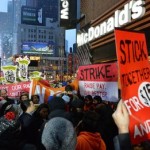
Posted by dharvie in School of Business Blog on February 11, 2015
Senior Lecturer in Finance and Political Economy, David Harvie, suggests the UK’s nascent social investment market is more a matter of imposing market discipline and less a matter of ‘doing well by doing good’. David Cameron’s ‘Big Society’ star lit up the post-crisis landscape when it was first introduced in November 2009. As students of […]
Posted in Uncategorized | Tagged Austerity, Big Society, Big Society Capital, Bonds, Capitalism, Competition, Competitiveness, Corporate Social Responsibility (CSR), David Cameron, Department for Work, Derivatives, Economics, Finance, Financial Crisis, Financialization, investment, NEETs, Neoliberalism, New Economics Foundation, Pensions and Employment, Politics, Real Subsumption, Social Finance, Social Impact Bonds, Social Investment, Social Movements, Social Reform, Social Return on Investment, Third Way |
Posted by Chris Grocott in School of Business Blog on February 4, 2015
Lecturer in Management and Economic History at the School, Chris Grocott, outlines a little known escapade of a largely known economist Friedrich Hayek’s ideas on how economies should be organised, or on how state power should be restrained, have affected us all. Daniel Stedman Jones’s Masters of the Universe selected Hayek, alongside Milton Friedman, […]
Posted in Uncategorized | Tagged Economic Policy, Economics, Economy & Society, Fascism, Financialization, Franco, Free Market, Freedom, Friedrich Hayek, Gibraltar, Hayek, Keynes, Labour Market, Liberalism, Liberty, Neoliberalism, Nobel Prize, Political Economy, Politics, Reagan, Spain, Thatcher, The Road to Serfdom, Totalitarianism |
Posted by Angus Cameron in School of Business Blog on January 28, 2015
Amidst the occasionally apocalyptic commentaries on the likely consequences of Greece’s recent general election results, Angus Cameron, the Deputy Director of School, drives a wedge between the potential loss of the Euro and the historical ‘project’ of Europe Syriza’s victory has stimulated renewed speculation that Greece might withdraw from the Euro, putting the entire European […]
Posted in Uncategorized | Tagged Bureaucracy, Crisis, Democracy, Economic Crisis, Election, EU, Euro, Financial Crisis, Financialization, Greece, Grexit, History, Identity, Nationalism, Politics, Refuge, Syriza |

Posted by Martin Quinn in School of Business Blog on December 17, 2014
Lecturer in Regional Development at the School Martin Quinn outlines his proposal for a new regional development infrastructure The recent referendum on Scottish independence has plugged ‘the West Lothian Question’ back into the political mainstream. Tam Dayell’s original concern in raising this question was with parliamentary representation whereas today the controversy is over parliamentary devolution. […]
Posted in Uncategorized | Tagged British Law, Catalyst Corby, Conservative Party, Democracy, Deregulation, East Midlands, East Midlands Development Agency, englishness, HS2, Local Enterprise Partnerships, Parliament, Politics, Public Private Partnerships, Regional Development, Regional Development Agencies, Regional Development Agency, Regions, Resources, Scotland, Scottish Independence, Slack Resources, West Lothian Question
Posted by Richard Courtney in School of Business Blog on December 3, 2014
On the day of 2014’s Autumn Statement, Richard Courtney, Lecturer in Employment Studies at the School, opposes the ideology of minimum taxation I used to get excited by budget statements. Listening to and subsequently dissecting how the government’s representatives say they are ‘balancing the books’ still reminds me of why I initially became a sociologist. […]
Posted in Uncategorized | Tagged Arts Council, August Statement, Austerity, Budget, Financial Crisis, George Osborne, Handbag Economics, Keynesianism, Mary Mellor, Money, Money Supply, Neoliberalism, Paul Krugman, Politics, Protectionism, Richard Courtney, Sociology, Tax, Taxation |
Posted by Fabian Frenzel in School of Business Blog on November 26, 2014
This week the School launches its Principles of Responsible Management Education (PRME) student working group. Fabian Frenzel, Lecturer in the Political Economy of Organisation, explains why Founded in 2007, PRME is a UN led initiative which aims to redress the demonstrable lack of care and responsibility taken by managers of increasingly powerful global corporations. It […]
Posted in Uncategorized | Tagged Anti-Corporate, Critical Management Studies, Critique, Environmentalism, Ethics, Fair Pay, Management Education, Management Pedagogy, Neoliberalism, Politics, Poverty, Principles of Responsible Management Education, PRME, Self-Regulation, Self-Reporting, Social Movements, Student Centred Learning, Sustainability, Sustainability Reporting, Tax Evasion, tourism, UN, UN Global Compact, United Nations, University |

Posted by Paul Brook in School of Business Blog on November 19, 2014
In the age of much austerity and few alternatives, Paul Brook, Senior Lecturer in the Sociology of Work and Employment at the School, makes a renewed claim for a politics of labour mobilisation Not long after Occupy Wall Street re-injected the idea of class (‘We are the 99%’) into America’s political consciousness, fast food workers […]
Posted in Uncategorized | Tagged Arun Gupta, Barack Obama, Burger King, Civil Disobedience, Class, Consumerism, Dunkin' Donuts, Employment Relations, Fast Food, Fight for 15, Flexibility, Ideology, Industrial Relations, Labour, Labour Market, Labour Mobilisation, Living Wage, McDonalds, Mobilisation, Neoliberalism, Occupy, Occupy Wall Street, Part-Time Work, Paul Brook, Pizza Hut, Politics, Poverty, Private Sector, SEIU, Sit-Down Strikes, Strike Action, Struggle, Taco Bell, Trade Unionism, UFCW, Union Rights, Walmart, Work and Employment

Posted by Rutvica Andrijasevic in School of Business Blog on November 10, 2014
Rutvica Andrijasevic, Lecturer in Employment Studies at the School, overviews some provisional findings from the research she has been doing into the ongoing protest While ‘Occupy Central’ has become the umbrella term applied to Hong Kong’s ongoing mobilisations, three less heeded groups are also playing very active roles within it. Scholarism, founded by Joshua […]
Posted in Uncategorized | Tagged Admiralty, Barricades, Benny Tau, Causeway Bay, Chan Kin, Chu Yiu, Citizenship, Consumer Culture, Consumerism, Cyber-Politics, Debate, Democracy, Electoral Reform, Ethnography, Federation of Students, Hong Kong, Joshua Wong, Kowloon, Mobilisation, Mong Kok, Occupy, Occupy Central, Occupy Central with Love and Peace, Occupy Hong Kong, Police, Politics, Poverty, Protest, Protest Camps, Public Debate, Scholarism, Sociology, Solidarity, Sovereignty, Student Protest, surveillance, Tiananmen Square |
Posted by Tomasz Wisniewski in School of Business Blog on October 21, 2014
Geoff Lightfoot and Tomasz Wisniewski, Senior Lecturers in the School’s Finance and Accounting Group, describe information asymmetry as a politically prevalent predicament about which we should all be concerned Knowledge production has always been a political matter to the extent that it has always coincided with the production of ignorance. The Ancient Egyptian priests protected […]
Posted in Uncategorized | Tagged CCTV, Crime, document classification, education, Edward Snowden, Finance, GPS, Ignorance, Information, information asymmetry, Information Technology, Market Disruption, Market Failure, Mass Communication, Mass Media, media, networks, Noam Chomsky, Politics, power, propaganda, RFID, Stephen Lukes, surveillance, Technology, Terrorism, Transparency
Posted by Thomas Swann in School of Business Blog on August 20, 2014
Thomas Swann, Graduate Teaching Assistant at the School and the recent recipient of a Times Higher Education Best Essay Prize, encourages us to pay more attention to the Grassroots of the movement toward Scottish Independence Those who struggled through the recently televised debate between between Alex Salmond and Alistair Darling witnessed a pretty dour affair. […]
Posted in Uncategorized | Tagged Alistair Darling, Broadcast, Campaigns, Debate, Driech, Grassroots, NGO, Nuclear Disarmament, Political Economy, Political Philosophy, Politics, Radical Theory, Referendum, Scotland, Scottish Independence, Scottish National Party, Social Justice, Yes Campaign





Recent Comments